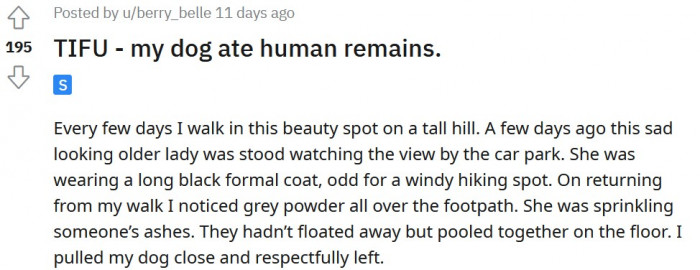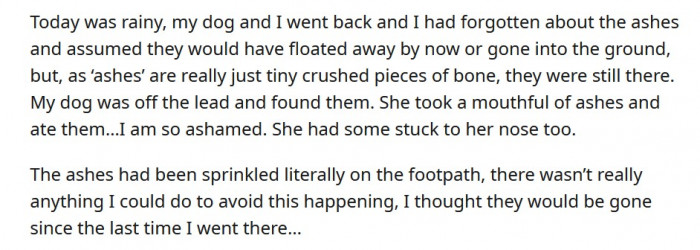Ashamed Dog Owner Posts On Reddit About How Their Doggo "Ate Human Remains"
Dogs are essentially our children, right? We love them just as much, and we refer to ourselves as their parents.
The thing about children, though, is that they have a mind of their own and can easily embarrass us with their actions. But how can we get mad at them when they're just so darn innocent?
Reddit user u/berry_belle recently posted in the TIFU (Today I F-d Up) subreddit about an experience she had with her dog. She explained how she takes her dog for a walk in a beautiful hiking spot on a hill every few days.
One day, she noticed an elderly lady dressed in black sprinkling a "grey powder" on the footpath. She later realized that the woman was scattering someone's ashes.
As the OP walked past, she pulled her dog close so as not to disturb the ashes and left. However, the next time the OP returned to that spot with her dog, the ashes were still there.
The Reddit user had her dog off-lead, and as they walked past, the dog took a mouthful of the ashes and ate them. Oh, the horror!
The OP explained that the ashes had been spread right on the path, making it nearly impossible to avoid them. But she still feels terrible that her dog ate someone's remains.
You can read the Reddit user's story in full below.
Reddit user u/berry_belle told the story of how she walked her dog in the same spot every few days: a beautiful hiking track on a hill.

She explained that she had assumed the ashes would have blown away by the time she returned with her dog.

Too long; didn't read? Here's the short version.

The Role of Shame in Pet Ownership
Shame is a powerful emotion that can arise in unexpected situations, such as a dog's inappropriate behavior. According to research published in the Journal of Personality and Social Psychology, shame often leads to avoidance behaviors and reduced self-esteem.
For dog owners, the embarrassment of their pet's actions can reflect back on their perceived abilities as caregivers, leading to feelings of inadequacy. This emotional response can hinder the owner from seeking support or guidance.
Ultimately, understanding that pets mirror our emotional states can provide insight into their behavior. Research indicates that dogs can pick up on their owner's anxiety or stress, which may exacerbate problematic behaviors.
By fostering a calm and positive environment, pet owners can help their dogs feel more secure, reducing incidents of misbehavior. This awareness can empower owners to reframe their perspective, viewing mistakes as opportunities for growth rather than sources of shame.
The Psychology of Guilt and Shame
Dr. Henry Foster, a clinical psychologist at the University of Michigan, explains that feelings of guilt and shame can significantly affect one's mental health.
His research suggests that guilt often arises from actions that conflict with personal morals, while shame stems from a perceived failure of the self.
Understanding these emotions is vital for addressing underlying issues and promoting healing.
Here's how people reacted.

Better watch your back!

The doggo is just helping.

Social norms play a significant role in how we perceive and react to our pets' behaviors. Research indicates that pet owners often feel societal pressure to uphold a specific image, particularly when it comes to their pets' manners.
This phenomenon, known as 'social comparison,' can exacerbate feelings of shame when a pet misbehaves. According to studies, those who engage in social comparison tend to experience increased anxiety and lower self-worth, which can further complicate the owner's emotional response to the incident.
Moreover, studies indicate that guilt can motivate positive change, while shame tends to lead to avoidance behaviors.
Recognizing the difference between these emotions can help individuals navigate their feelings more effectively and foster healthier coping mechanisms.
Therapeutic interventions often focus on transforming shame into guilt, allowing for constructive change.
Don't think the ashes will mind.

It's a final act of doggo kindness.

"The dog will probably eat your remains if you died and no one checked on you."

Understanding Behavioral Triggers
Understanding the reasons behind a dog's behavior is crucial in managing feelings of shame. According to Dr. Ramani Durvasula, a clinical psychologist, "Dogs often act out due to stress or fear, and recognizing these emotions is the first step toward better behavior." For owners, identifying these triggers can shift the focus from embarrassment to proactive behavioral training. Implementing positive reinforcement techniques, as suggested by Dr. Jane Nelsen, a parenting expert, can help cultivate better behavior, fostering a healthier relationship between the dog and owner.
Healing from Guilt and Shame
To address feelings of guilt and shame, psychologists recommend engaging in self-forgiveness practices.
Research shows that self-compassion can alleviate the negative impact of these emotions, promoting greater emotional resilience.
Mindfulness techniques can also help individuals process their feelings without judgment, leading to healthier emotional outcomes.
Hmm, yes, why was the pig near a dead person?

Dogs are pretty gross, to be fair.

That's funny, I mean PUN-ny!

Research shows that pet ownership can significantly impact mental health, often providing emotional support and companionship. However, when incidents like the one described occur, owners may experience guilt or shame that detracts from these benefits. According to Dr. Madeline Levine, a child psychologist, "It's important for pet owners to practice self-compassion and understand that all pets can exhibit challenging behaviors." Recognizing this can alleviate feelings of inadequacy and promote healthier relationships, allowing owners to focus on the joy their pets bring into their lives.
Additionally, discussing feelings of guilt and shame with trusted individuals can foster support and understanding.
Group therapy settings can provide valuable insights and reduce feelings of isolation, enhancing the healing process.
Creating spaces for open dialogues about these emotions can normalize the experiences and encourage personal growth.
"I would consider having my cremated remains consumed by a noble doggo as a great honor."

Agreed!

"Leave it!!!"

Coping Mechanisms for Pet Owners
To cope with feelings of shame, pet owners can benefit from developing healthy emotional regulation strategies. According to clinical psychologists, practicing mindfulness can help owners detach from negative emotions associated with their pets' actions.
Techniques such as deep breathing, journaling, and engaging in supportive communities can enhance emotional resilience. Research emphasizes that fostering a positive mindset can not only improve the owner's well-being but also lead to better behavioral outcomes for the pet.
It's a dog's life.

Who says it was human remains?

Was it a Golden Retriever?

Communication with other pet owners can help alleviate feelings of isolation and shame. Studies indicate that sharing experiences with peers fosters a sense of belonging, which can be beneficial for mental health.
Joining local pet groups or online communities allows owners to share their stories, thereby normalizing the ups and downs of pet ownership. This social support network can be crucial in promoting emotional healing and reducing the stigma associated with pet-related mishaps.
Yep, pretty sure they are grey.

Ick!

"Hope he liked the taste of Fred."

The Importance of Training and Socialization
Training and socialization are vital components of responsible pet ownership. A study in the 'Journal of Applied Animal Welfare Science reveals that well-trained dogs are less likely to engage in embarrassing behaviors.
Owners should consider enrolling in training classes, which not only teach commands but also improve the bond between pet and owner. Investing time in training can significantly reduce stress and shame surrounding unexpected behaviors.
Is it actually crushed bone?

So, what's your take on this story? Do you think the OP "f-d up" by taking her dog along that path?
It seems that no matter what, someone's dog would have come across the ashes on the path. And, let's be honest, dogs will be dogs!
The OP couldn't have known that the ashes would still be there or that her dog would decide to have a snack. It's just one of those things, really!
Dogs will always act on instinct. And if something looks tasty, you better believe they're going to eat it!
Has your dog ever done anything like this? We would love to hear your stories in the comments section!
Psychological Analysis
This situation highlights the heavy burden that guilt and shame can impose on individuals. Recognizing and addressing these feelings is crucial for emotional well-being.
Encouraging self-forgiveness and open discussions can facilitate healing and growth.
Analysis generated by AI
Analysis & Alternative Approaches
Understanding guilt and shame is essential for healing and personal growth.
By fostering self-compassion and open dialogues, individuals can navigate these complex emotions more effectively.
Feeling embarrassed about a pet's behavior can lead to deeper issues surrounding self-worth and shame. Experts suggest that recognizing these emotions as common experiences among pet owners is essential for mental well-being. With support and effective strategies, pet owners can learn to navigate these challenges positively. Engaging in training, socialization, and communication can help mitigate feelings of shame, transforming potential crises into opportunities for learning and connection. Acknowledging that nobody is perfect—pets included—can foster a healthier relationship between owners and their beloved companions.



